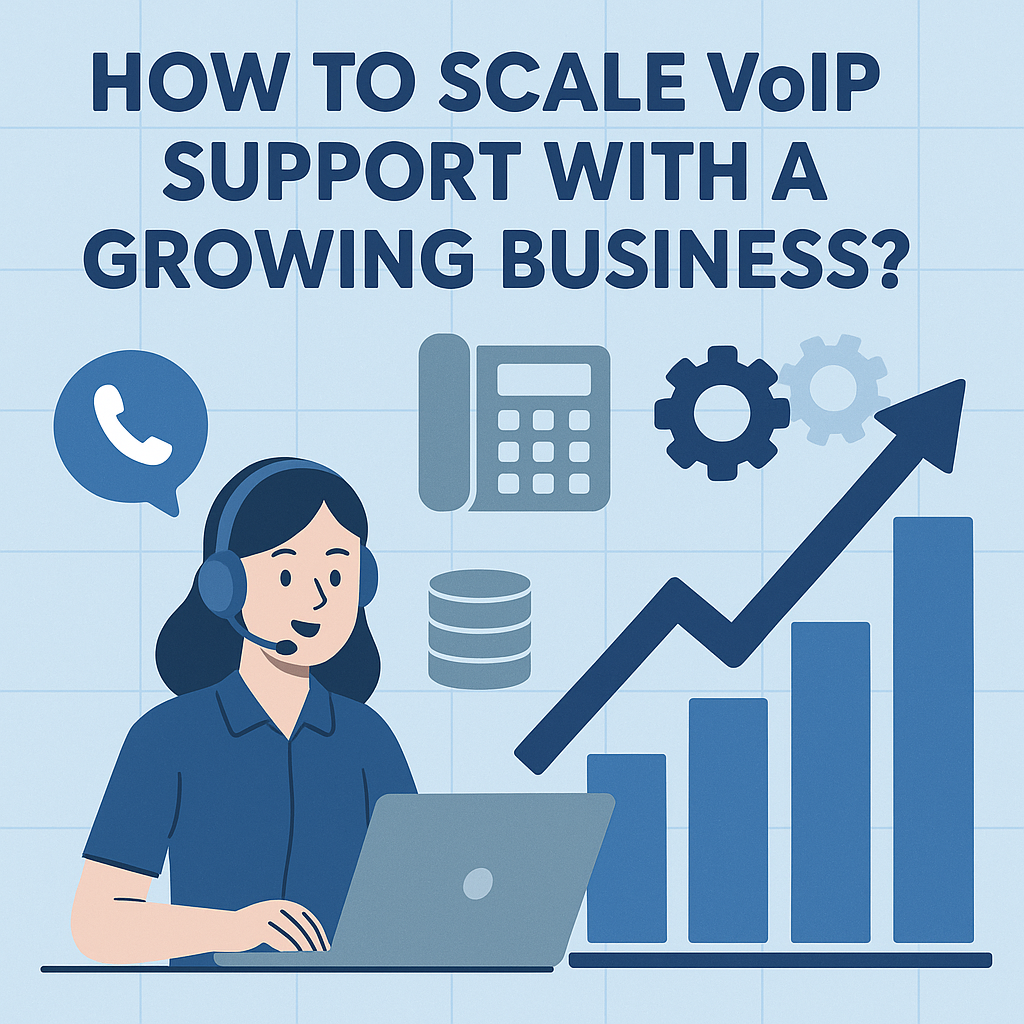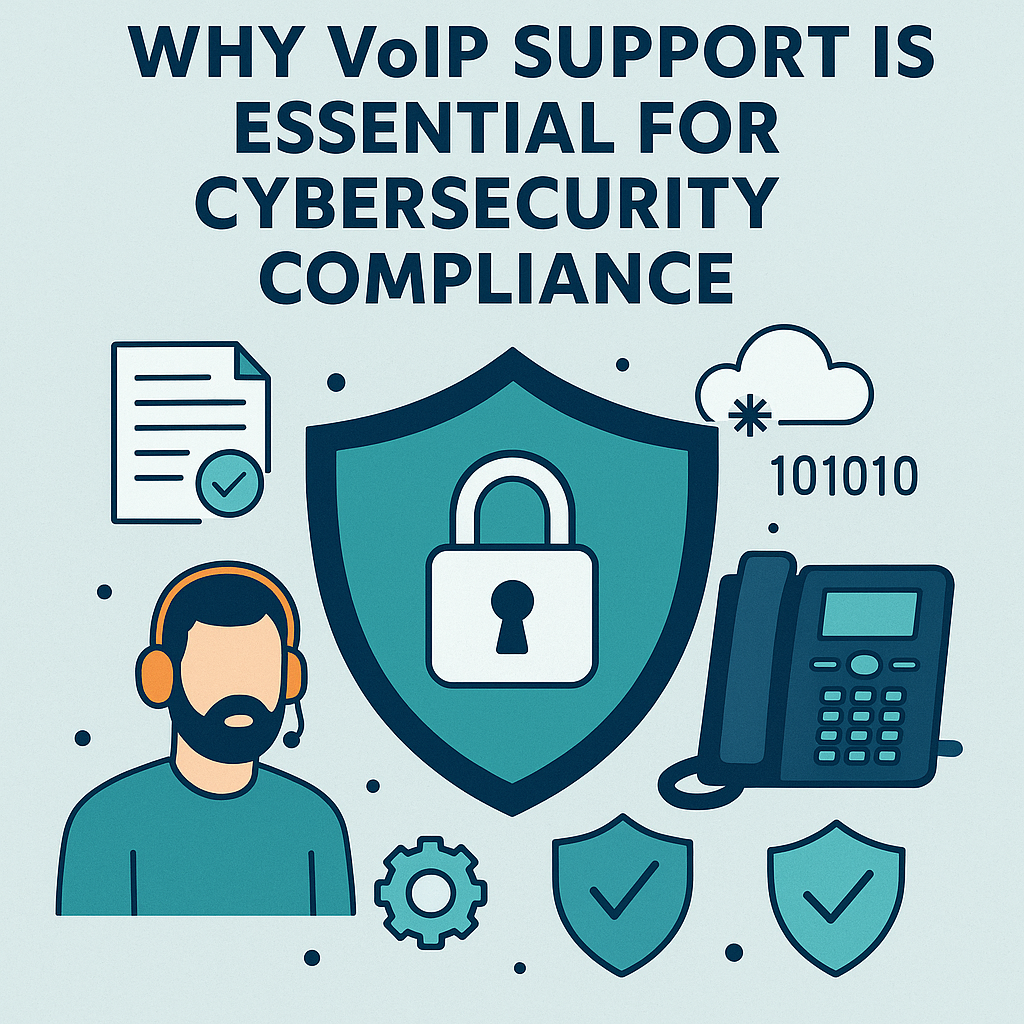How VoIP Support Helps Prevent Call Spoofing and Fraud
Introduction to VoIP and the Rising Threat of Call Fraud
Voice over Internet Protocol (VoIP) has become a cornerstone of business communication. Its ability to transmit voice calls over the internet has not only streamlined communication but also significantly reduced operational costs. However, with the increasing reliance on VoIP systems, businesses face growing risks related to call spoofing and fraud.
Call spoofing, in particular, has become a major concern, with scammers exploiting VoIP technology to manipulate caller ID information. These fraudulent activities can lead to financial losses, data breaches, and reputational damage. In this article, we’ll explore how VoIP support helps prevent these malicious actions and why choosing the best business VoIP service is essential for secure communication.
📞 What is VoIP and How It Transforms Business Communication
VoIP technology converts voice signals into digital data, transmitting them over the internet instead of traditional phone lines. This innovation has enabled businesses to cut costs, improve flexibility, and enhance communication capabilities.
🌱 How VoIP Improves Small Business Efficiency
- Cost Reduction: No need for expensive hardware or maintenance.
- Remote Work Enablement: Employees can communicate from anywhere with an internet connection.
- Seamless Integration: VoIP integrates with CRM systems, improving customer service.
- Scalability: Easily add or remove lines as your business grows.
Small businesses particularly benefit from VoIP’s scalability and affordability. By adopting advanced security protocols, these enterprises can also protect themselves against spoofing attacks and fraudulent activities.
🕵️ Understanding Call Spoofing: A Growing Concern for Businesses
Call spoofing occurs when a caller falsifies the caller ID to appear as someone else. Fraudsters often impersonate banks, government agencies, or trusted companies to deceive recipients into sharing sensitive information.
⚠️ How Call Spoofing Works
- Caller ID Manipulation: Spoofers use VoIP tools to alter the displayed number.
- Social Engineering: Attackers use fear or urgency to manipulate victims.
- Technical Exploits: Exploiting VoIP vulnerabilities to hijack calls.
Real-World Impact:
- Loss of customer trust.
- Financial damages from scams.
- Regulatory penalties for compromised businesses.
📜 The Evolution of Call Fraud Tactics
Fraud tactics have evolved alongside communication technologies. Early scams involved basic call spoofing, but today’s methods are far more sophisticated.
🔍 Key Call Fraud Tactics
- Neighbor Spoofing: Imitates local numbers to increase answer rates.
- Robocalling: Automated messages promoting scams.
- Toll Fraud: Misuses VoIP systems for unauthorized international calls.
- Wangiri (One-Ring) Fraud: Tricks victims into calling premium-rate numbers.
Understanding these tactics is crucial for businesses looking to implement effective prevention strategies.
🛠️ VoIP and Its Crucial Role in Modern Businesses
VoIP technology has become indispensable for businesses of all sizes. From customer support to internal communication, its applications are vast. However, the increasing adoption also attracts fraudsters.
Why VoIP is Targeted:
- Internet-based systems are easier to exploit remotely.
- Lack of security updates leaves systems vulnerable.
- The growing number of VoIP users provides more potential victims.
Selecting top business VoIP providers with advanced security features is vital for minimizing risks.
🔐 How VoIP Support Helps Prevent Call Spoofing and Fraud
VoIP systems incorporate various mechanisms to detect, block, and mitigate spoofed calls.
⚙️ Core Anti-Fraud Features in VoIP Systems:
- Caller ID Authentication: Verifies the legitimacy of incoming calls.
- Call Blocking: Prevents calls from known fraudulent numbers.
- Traffic Analysis: Monitors unusual call patterns.
- User Verification: Ensures only authorized users access the system.
These features, combined with proactive security measures, create a robust defense against spoofing and fraud.
🛡️ Caller ID Authentication: The Frontline Defense
The STIR/SHAKEN protocols represent a groundbreaking advancement in call authentication.
🧬 How STIR/SHAKEN Works:
- STIR: Assigns a digital certificate to calls from verified sources.
- SHAKEN: Cross-verifies the certificate with the recipient’s network.
Benefits:
- Reduces robocalls and spoofed calls.
- Increases customer confidence in displayed caller information.
Major VoIP providers now integrate these protocols to enhance call authenticity.
🔏 VoIP Encryption: Safeguarding Sensitive Communication
Encryption ensures that conversations remain private and secure.
Primary Encryption Protocols:
- TLS (Transport Layer Security): Protects signaling data.
- SRTP (Secure Real-Time Transport Protocol): Encrypts voice and video streams.
Encrypted communication is critical for sectors like finance and healthcare, where privacy regulations are stringent.
🤖 AI-Powered Call Monitoring and Anomaly Detection
Artificial intelligence has become a key player in VoIP security.
How AI Enhances Fraud Detection:
- Pattern Recognition: Detects deviations from normal call patterns.
- Real-Time Alerts: Notifies administrators of suspicious activity.
- Behavior Analysis: Identifies high-risk behaviors and potential breaches.
AI’s ability to adapt and learn makes it a powerful tool against emerging threats.
🚀 VoIP Trends: Innovations Shaping Call Security
The VoIP industry continues to evolve, introducing new technologies to improve security.
🔮 Key VoIP Trends:
- Blockchain for Call Verification: Immutable call records to track spoofing attempts.
- 5G Integration: Faster, more secure connections.
- AI-Driven Security Solutions: Improved threat detection with machine learning.
- Hybrid VoIP Solutions: Combining on-premises and cloud systems for better control.
Keeping up with these VoIP trends ensures businesses stay ahead of potential threats.
🏆 Top Business VoIP Providers and Their Security Features
Choosing the right VoIP provider is crucial for fraud prevention.
🔍 Key Features to Look For:
- STIR/SHAKEN Compliance
- End-to-End Encryption
- AI-Based Monitoring
- Regular Security Updates
Examples of Leading Providers:
- Provider A: Known for advanced AI analytics.
- Provider B: Offers strong encryption and global coverage.
- Provider C: Specializes in scalable solutions for growing businesses.
Partnering with top business VoIP providers helps ensure robust protection against spoofing attacks.
🧩 Business VoIP Solutions for Small and Large Enterprises
VoIP providers offer tailored solutions based on business size and requirements.
🏢 Small Business VoIP Solutions:
- Cost-effective and scalable.
- User-friendly interfaces.
- Essential security features like encryption and call blocking.
🏙️ Enterprise VoIP Solutions:
- Advanced analytics and reporting.
- Multi-layered security frameworks.
- Integration with existing enterprise tools.
Investing in comprehensive business VoIP solutions is crucial for long-term security and operational efficiency.
🔑 Practical Steps for Businesses to Protect Against Call Fraud
- Adopt STIR/SHAKEN Protocols: Ensure calls are authenticated.
- Implement Multi-Factor Authentication (MFA): Add extra layers of user verification.
- Regularly Update Software: Patch vulnerabilities before they are exploited.
- Train Employees: Educate staff about spoofing tactics and safe communication practices.
- Use AI-Based Monitoring: Leverage advanced tools to detect suspicious activity.
📖 Real-Life Examples: How Companies Successfully Prevented Call Fraud
🏦 Case Study 1: Financial Services Firm
- Challenge: Surge in spoofed customer service calls.
- Solution: Implemented STIR/SHAKEN and AI monitoring.
- Outcome: 65% reduction in fraudulent calls within six months.
🛒 Case Study 2: E-Commerce Company
- Challenge: Increased robocalls disrupting operations.
- Solution: Deployed call filtering and staff training.
- Outcome: 70% decrease in fraudulent activity.
🧠 Choosing the Right VoIP Service for Business Security
With numerous providers in the market, selecting the right service can be daunting.
🎯 Key Considerations:
- Security Features: Does the provider use encryption and call authentication?
- Scalability: Can the service grow with your business?
- Customer Support: Is 24/7 support available in case of issues?
Opting for reliable VoIP services for business can significantly reduce the likelihood of call fraud.
🔍 The Future of VoIP Security
The VoIP landscape continues to innovate, with new security tools and protocols on the horizon.
Emerging Technologies:
- Quantum Encryption: For unbreakable data protection.
- Biometric Authentication: Fingerprint and voice recognition for access control.
- Decentralized Identity Management: Blockchain-based caller ID verification.
Businesses that stay informed about these advancements will be better equipped to protect themselves.
🙋♀️ FAQs About VoIP, Call Spoofing, and Fraud Prevention
1. What is call spoofing and why is it dangerous?
Call spoofing involves altering the caller ID to deceive recipients. It can lead to data breaches, financial fraud, and loss of trust.
2. How does VoIP support help prevent spoofing?
VoIP systems use caller ID authentication, encryption, and AI-driven monitoring to detect and block spoofed calls.
3. What are the latest VoIP trends in call security?
Emerging trends include blockchain-based verification, AI-driven anomaly detection, and quantum encryption.
4. Can small businesses afford advanced VoIP security?
Yes, many providers offer affordable business VoIP services with robust security features.
5. How do STIR/SHAKEN protocols work?
They assign digital certificates to calls, verifying caller identity and reducing spoofed calls.
6. What’s the difference between VoIP services for business and residential VoIP?
Business VoIP services offer advanced features like call analytics, multi-line support, and enhanced security protocols.
🏁 Conclusion: Strengthening Business Communication with Secure VoIP Solutions
VoIP technology is a powerful tool for modern businesses, offering unparalleled flexibility and efficiency. However, the risk of call spoofing and fraud requires vigilance and proactive security measures. By partnering with top business VoIP providers, implementing robust security protocols, and staying informed about the latest VoIP trends, businesses can protect their communication channels and maintain customer trust.
Investing in secure business VoIP solutions today ensures safer, more reliable communication tomorrow.





No comment